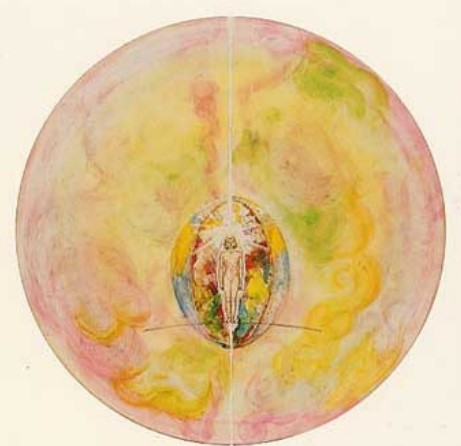
GOD
神
(1) God, the Universal Mind, Energy, Force, the Absolute, the Unknown – these terms and many others are forced from the lips of those who, by means of the form side, seek the Dweller within the form, and cannot find Him as yet. This failure to find Him is due to the limitations of the physical brain, and to the lack of development in the mechanism whereby the spiritual may be known, and whereby He may, and eventually will, be contacted. (3 – 238).
(1)神、宇宙心智、能量、力量、绝对、未知 —— 这些术语和很多其他术语都是从通过形态的面向来寻求居住在形态中的居住者的人口中说出的,但是仍然无法找到祂。未能找到祂的原因是由于物质大脑的局限,以及缺乏了解灵性运作机制的培养,这些运作机制最终会让他与祂建立连接。
(2) What the scientist calls energy, the religious man calls God, and yet the two are one, being but the manifested purpose, in physical matter, of a great extra-systemic Identity. Nature is the appearance of the physical body of the Logos, and the laws of nature are the laws governing the natural processes of that body. The Life of God, His energy, and vitality, are found in every manifested atom; His essence indwells all forms. This we call Spirit, yet He Himself is other than those forms, just as man knows himself to be other than his bodies. He knows himself to be a will, and a purpose, [Page 132] and as he progresses in evolution that purpose and will become to him ever more consciously defined. So with the planetary Logos and solar Logos. They dwell within, yet are found without, the planetary scheme or solar system. (3 – 1136).
(2)科学家所谓的能量,宗教人士称之为神,两者指代的是相同的,是一个伟大外在体系身份在物质状态中表达的目的。大自然是逻各斯物质身体的显化,自然法则是主宰那身体自然过程的法则。神的生命、它的能量和活力,存在于每一个显化的原子中;他的精华存在于所有形态中。我们称此为圣灵,然而祂自己并不是那些形态,就像一个人知道他自己不是他的身体那样。祂知道自己是意志,一种目的,随着他在进化中的进展,这目的和意志会越来越有意识地定义出来。行星逻各斯和太阳逻各斯也是如此。他们居住在行星或太阳系之中,也超越了这些。
(3) Only as a man understands himself can he arrive at an understanding of that which is the sum total that we call God. (4 – 29).
(3)只有一个人真正了解自己时,他才能了解我们称之为神的那个总和。
(4) God Transcendent eternally exists, but can only be seen and known and correctly approached, by God Immanent – immanent in individual man, in groups and nations, in organised forms and in religion, in humanity as a whole, and in the planetary Life Itself. (10 – 162).
(4)伟大的神永恒地存在着,但是只有通过内在的神,才能看到、知晓、并正确地接近祂 —— 存在于每个人、团体、国家、有组织的形态和宗教、以及整个人类和行星生命自身的内在。
(5) In attempting to describe “Pure Being” or God, and in the effort to arrive at some understanding of the nature of divinity, the formula of negation has been evolved. God is not this; God is not that; God is no-thing; God is neither time nor space; God is not feeling or thought; God is not form or substance. God simply IS. (10 – 244).
(5)在试图描述“纯粹的存在”或神,以及在致力于达到对神性本质的某些理解的过程中,否定的公式得到了发展。神不是这个,神不是那个,神不是什么东西,神也不是时间或空间,神不是感觉或想法,神不是形态或物质。神即所是。
(6) The Problem of God: The fact of God will be established, and men’s questioning in this respect will end. Such a God will not be a figment of man’s creative imagination, or an extension of his own consciousness, but a Deity of essential life, who is the sum total of all energies . . . a God most surely transcendent, but at the same time most assuredly immanent; a God of such immensity that the Heavens proclaim Him, and so intimate that the humblest child can recognise Him. . . . With the eye of the inner vision can God be seen, even when man is occupying a body of flesh. Not with the physical eye can Deity be seen, though the hallmark of divinity is everywhere. There is an eye which can be developed and used, and which will enable its possessor to see God working on the inner side of Life, within Himself and within all forms, for “when thine eye is single, thy whole body is full of light”. In that light shall we see Light, and so see God. (14 – 182).
(6)神的问题:神存在的事实会被建立,人对这方面的质疑会结束。这样的神不是人在创造性想象中的虚构,也不是他自己意识的延伸,而是生命本质的神,是所有能量的总和…神当然是极其伟大的,但是与此同时又是非常内在的;一位如此浩瀚的神,以至于诸天都在宣告祂,同时祂又存在于内在,连最谦卑的孩子也可以认出祂…用内在的视觉可以看到神,即便是当这个人占据一具肉身时也是如此。尽管神性的标志无处不在,但是肉眼无法看到神。有一只可以去开发和使用的眼睛,拥有它的人可以看到神在生命内在的运作,在他自己内在和所有形态中的运作,因为“若是你的眼睛是明亮的,你的整个身体都会充满光。”在那光中,我们会看到圣光,从而看到神。
(7) To portray adequately the wonder and the destiny of the human kingdom, lies beyond my powers or the power of any human pen, no matter how great a man’s realisation may be, or his response to the beauty of God’s world. Divinity must be lived, expressed and manifested, to be understood. God must be loved, known and revealed within the human heart and brain, in order to be intellectually grasped. (14 – 313).
(7)要充分描绘出人类王国的奇迹和命运,这超越了我的力量,也超越了任何人类可以描述的力量,不论一个人的认知有多么伟大,不论这个人对神之世界的美丽回应如何。
神性必须被活出、表达出、彰显出,才能被理解。神必须在人的心灵和大脑中被爱、被认知、被揭示出,从而在智力上得到理解。
(8) We have spoken here of God in terms of Person, and we have used therefore the pronouns, He and His. Must it therefore be inferred that we are dealing with a stupendous Personality which we call God, and do we therefore belong to that school of thought which we call the anthropomorphic? The Buddhist teaching recognises no God or Person. Is it, therefore, wrong from our point of view and approach, or is it right? Only an understanding of man as a divine expression in time and space, can reveal this mystery.
(8)我们这里用位格来谈论神,因此我们使用了代词,祂和祂的。因此,是否一定要推断出我们正在与一个我们称之为神的巨大人格打交道,我们是否进入了所谓的拟人化的思想流派?但佛学教义不承认神或位格。因此,从我们的观点来看,这是对还是错?只有把人理解为在时间和空间中的神圣表达时,奥秘才可以被揭示出来。
Both schools of thought are right, and in no way contradict each other. In their synthesis and in their blending, the truth as it really is can begin – aye, dimly – to appear. There is a God Transcendent Who “having pervaded the whole universe with a fragment of Himself” can still say: “I remain”. There is a God Immanent, Whose Life is the source of the activity, intelligence, growth and attractiveness, of every form in all the kingdoms of nature. There is likewise in every human being a transcendent soul which, when the life cycle on earth has come and gone, and when the period of manifestation is over, becomes again the unmanifest and the formless, and which can also say: “I remain”. In form, and when in manifestation, the only way in which the human mind and brain can express its recognition of the conditioning divine life, is to speak in terms of Person, of Individuality. Hence we speak of God as a Person, of His will, His nature, and His form.
两种思想流派都是正确的,而且没有互相矛盾。在它们的总和与整合中,真正的真相开始 —— 是的,模糊地 —— 出现。有一位伟大的神,祂“以自身的一小部分遍布了整个宇宙”,仍然可以说:“我存在着”。有一位内在的神,祂的生命是自然界所有王国的每一种形态中的活动、智慧、成长和吸引力的源泉。同样地,在每个人的内在都有着这样一个伟大的灵魂,当地球上的生命周期来来去去,当显化期结束,生命再次进入未显化和无形的领域,祂仍然可以说:“我存在着”。在形态中,处于显化中时,人类的心智和大脑可以表达出调控性神圣生命的唯一方式,就是从位格、个体的角度来说话。因此,我们把神看作位格,拥有着意志、本性和形态。
Behind the manifested universe, however, stands the formless One, That which is not an individual, being free from the limitations of individualised existence. Therefore the Buddhist is right when he emphasises the non-individualised nature of Deity, and refuses to personalise Divinity. The Father, Son, and Holy Spirit of the Christian theology, embodying as they do the triplicities of all theologies, disappear also into the One, when the period of manifestation is over. They remain as One, with quality and life untouched and undifferentiated, as they are when in manifestation.
然而,在显化的宇宙背后存在的是无形态的合一,那不是一个个体,不受个体化存在的限制。因此,当佛教徒在强调神性的非个体化,并拒绝将神性人格化时,他们是正确的。基督教神学中的圣父、圣子和圣灵,体现了所有神学中的三重性,当显化期结束后,他们也都消失在合一之中。他们作为合一存在着,他们的特性和生命不受影响,也没有分化,就像他们在显化时一样。
An analogy to this appears when a man dies. Then his three aspects – mind or will, emotion or love, and physical appearance – vanish. There is then no person. Yet, if one accepts the fact of immortality, the conscious being remains! his quality, and purpose, and life are united with his undying soul. The outer form with its differentiations into manifested trinity, has gone – never again to return in exactly the same form or expression, in time or space.
当一个人死亡时,就会发生类似的状况。他的三个面向 —— 心智或意志、情感或爱、和物质身体 —— 消失了。那个人就不存在了。然而,一个人若接受永生这个事实的话,那么有意识的存有仍然是存在的!他的特质、目的和生命都与他不朽的灵魂融为一体。外在的形态以及三位一体的分化已经消失了 —— 再也不会以完全相同的形式或表达返回到时间或空间之中。
The interplay of soul and mind, produces the manifested universe, with all that is therein. When that interplay is persisting, either in God or in man, we use (for how else can we speak with clarity?) terms of human origin, and therefore limiting, such is our present stage of enlightenment – or should we say, unenlightenment? Thus the idea of individuality, of personality, and of form, is built up. When the interplay ceases, and mani-[Page 134] festation ends, such terms are no longer suitable; they have no meaning. Yet the undying one, whether God or man, persists.
灵魂与心智的互相作用,诞生了显化的宇宙,以及宇宙中的一切。当这种相互作用持续存在时,不论是在神、还是人之中,我们都使用的(否则我们如何能说得清呢?)是人类起源的术语,因此具有限制性,这就是我们当前所处的启蒙阶段 —— 或者我们应该说,未启蒙阶段?因此,个体化、人格和形态的观点就被建立起来了。当这种互动结束,显化终结,这样的术语就不再适用了,它们就没有意义了。然而,不朽者,不论是神还是人,仍然存在着。
Thus in human thought, preserved for us by the great Teacher of the East, the Buddha, we have the concept of the transcendent Deity, divorced from the triplicities, the dualities, and the multiplicity of manifestation. There is but life, formless, freed from the individuality, unknown. In the teaching of the West, preserved for us and formulated for us by the Christ, the concept of God Immanent is preserved, – God in us and in all forms. In the synthesis of the Eastern and Western teachings, and in the merging of these two great schools of thought, something of the superlative Whole can be sensed – sensed merely – not known. (15 – 229/31).
因此,由东方伟大的导师佛陀为我们保存下来的人类的思想中,我们有伟大的神的概念,脱离了三位一体、二元性、以及显化的多样性。存在的只有生命,无形的,不受制于个体化的、未知的。在西方的教导中,由基督为我们保存并形成的思想是,内在的神的概念得到保存 —— 神存在于我们之中,存在于所有形态中。在东西方教义的整合中,在这两个伟大思想流派的融合中,可以感知到最高级整体存在的某些东西 —— 仅仅是被感知到 —— 却不能被知晓。
(9) One of the most difficult things for the average thinking man to understand and to interpret, is the destructive process of what he (for lack of a better name) calls “the will of God”. This is one of the results (and only one) of a purely materialistic civilisation, which has laid all its emphasis upon the form side of experience, and thus regards physical well-being and physical comfort, plus material possessions, as the true goal of human effort. It is upon this widespread attitude and reaction that the new incoming light will concentrate itself; as the light reveals reality, the world of phenomena and the world of spiritual values will enter into a better, directed relation. (18 – 649).
(9)对一般的思考者而言,最难理解和解释的事情质疑,就是他称之为“神之意志”的破坏过程(因为没有更好的名字)。这是纯粹的唯物主义文明所带来的结果之一(也是唯一的一个),它把所有的重点都放在体验的形式方面,因此把身体的健康和身体的舒适、以及物质财富视为人应该为之努力的真正目标。正是基于这种普遍存在的态度和反应,新进来的光会更加集中于它自身,随着光揭示出现实,色相世界和灵性世界的价值将会进入一种更好、更直接的关系之中。
(10) The Eastern faiths have ever emphasised God Immanent, deep within the human heart, “nearer than hands and feet”, the Self, the One, the Atma, smaller than the small, yet all-comprehensive. The Western faiths have presented God Transcendent, Outside His universe, an Onlooker. God transcendent, first of all, conditioned men’s concept of Deity, for the action of this transcendent God appeared in the process of nature; later, in the Jewish dispensation, God appeared as the tribal Jehovah, as the soul (the rather unpleasant soul) of a nation. Next, God was seen as a perfected man, and the divine God-man walked the Earth in the Person of the Christ. Today we have a rapidly growing emphasis upon God immanent in every human being, and in every created form. Today, we should have the churches presenting a synthesis of these two ideas, which have been summed up for us in the statement of Shri Krishna in the Bhagavad Gita: “Having pervaded this whole universe with a fragment of Myself, I remain.” God, greater than the created whole, yet God present also in the part; God Transcendent guarantees the Plan of our world, and is the Purpose conditioning all lives from the minutest atom, up through all the kingdoms of nature, to man. (8 – 144/5).
(10)西方的信仰一直在强调神是内在的,深深地存在于人们的心中,“比手脚更近”,那是真正的自我,是合一的存在,是灵魂,比微小还要小,但却包罗万象。东方的信仰所呈现出的是神的超然伟大,存在于他的宇宙之外,是一个旁观者。首先,神的超然伟大限制了人对神性的概念,因为这种伟大超然的神在自然过程中发挥作用;后来,在犹太人的时代,神作为部落中的耶和华出现,作为一个国家的灵魂(一个相当不愉快的灵魂)。之后,神被看作完人,神圣的神人以基督的身份在地球上行走。现今,我们越来越强调存在于每个人、每个造物形态中内在的神。今天,我们应该让教会去整合这两种理念,这两种观点已经在《博伽梵歌》中克里希纳的描述里为我们总结过了:“我以自己的一个片段遍及整个宇宙,我仍然存在。”神,比创造出的整体还要伟大,同时,神也存在于部分之中;超然伟大的神确保了我们世界的计划,祂调控着从最小的原子一直到自然界所有王国、乃至人类所有生命的目的。
(11) Slowly, there is dawning upon the awakening consciousness of humanity the great paralleling truth of God Immanent – divinely “pervading” all forms, conditioning from within all kingdoms in nature, expressing innate divinity through human beings. . . . There is a growing and developing belief that Christ is in us, as He was in the Master Jesus, and this belief will alter world affairs and mankind’s entire attitude to life. (13 – 592).
(11)慢慢地,人类会觉醒至这样的意识中:内在的神与我们共同存在的伟大真理 —— 神圣地存在于所有形态之中,从内在调控着自然界所有的王国,通过人类表达出与生俱来的神性…人们越来越相信,基督就在我们内在,就像他在上师耶稣之中一样,这种信念将会改变世界上所有的事务,以及人类所有对生命的态度。
https://www.lucistrust.org/books/ponder_on_this/ponder_online/contents



